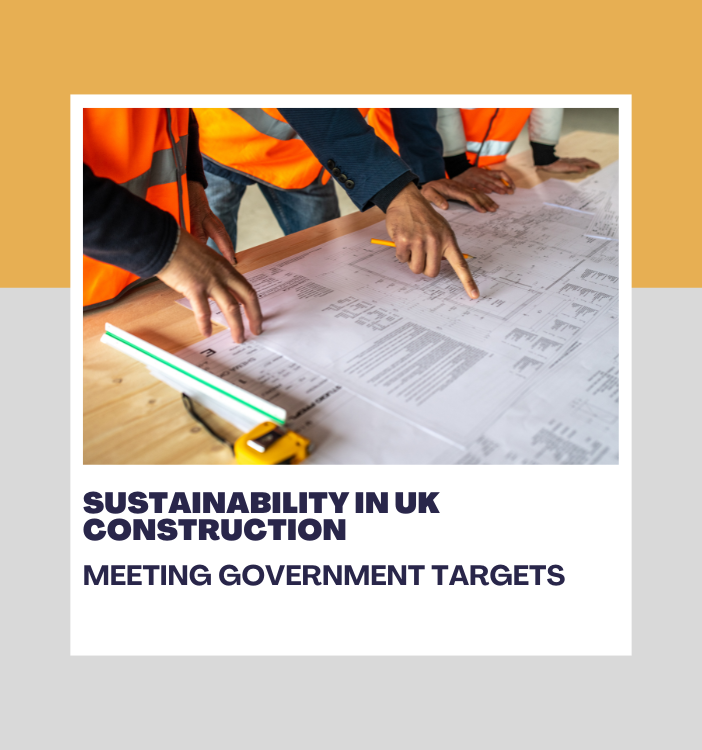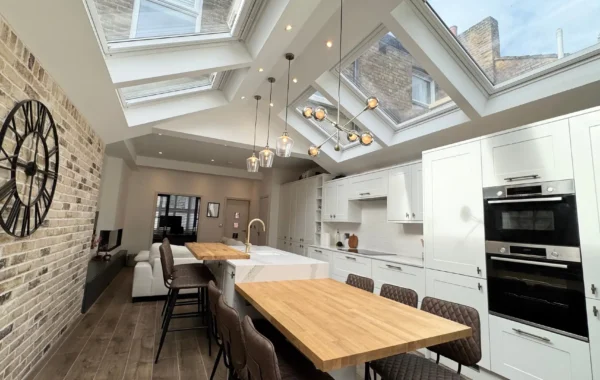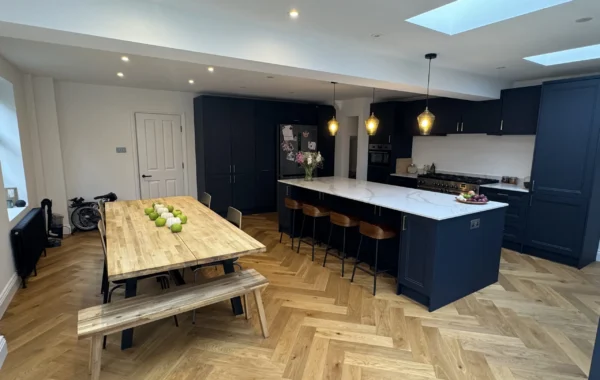The UK construction industry is amid a transformative shift as it adapts to the pressing sustainability demands. With government-backed initiatives pushing for greener practices, construction companies are expected to meet ambitious targets to mitigate climate change. This blog delves into how the industry aligns with these goals and what steps are taken to foster sustainability.

The UK’s Green Targets for Construction
The UK government has set stringent sustainability targets as part of its commitment to achieving net zero carbon emissions by 2050. The construction sector, responsible for approximately 40% of the UK’s carbon emissions, is crucial in reaching these goals. One of the critical frameworks in place is the Building Regulations Part L, which outlines the requirements for energy efficiency in new and existing buildings, mandating reduced carbon output in construction processes.
The Construction Leadership Council (CLC) also advocates for widespread adoption of green building standards, such as BREEAM (Building Research Establishment Environmental Assessment Method), which encourages sustainable development through energy-efficient designs and reduced resource consumption.
Energy-Efficient Construction
New builds and renovations must now incorporate energy-efficient technologies to minimize energy consumption. The focus is on materials and construction techniques that enhance insulation, such as triple-glazed windows, thermal envelopes, and recycled or low-carbon materials like timber and carbon-neutral concrete. Additionally, renewable energy systems like solar panels and heat pumps are becoming standard in residential and commercial construction.
Retrofitting Existing Building
A significant pillar of the UK’s sustainability drive involves retrofitting older properties. These renovations aim to bring inefficient buildings up to modern energy standards, often by improving insulation, upgrading windows, and incorporating low-energy systems like heat recovery ventilators. The government’s £1 billion decarbonization framework seeks to make UK homes more energy-efficient, with long-term benefits for both the environment and homeowners’ energy bills
Waste Reduction and Recycling
The construction industry generates millions of tons of waste each year, much of which could be recycled or reused. There has been a significant shift towards circular construction in recent years, where materials are reused and waste is minimized. Innovations like modular construction—where components are prefabricated and assembled on-site—reduce waste and energy consumption during construction. Companies also adopt waste management plans to ensure that as much material as possible is recycled or repurposed.
Green Building Certifications
Obtaining certifications like BREEAM and LEED (Leadership in Energy and Environmental Design) ensures that a building meets high sustainability standards and signals to clients that a company is committed to eco-friendly practices. These certifications encourage using sustainable materials, water conservation methods, and energy-efficient designs.
Government Support and Incentives
The UK government has introduced several financial incentives and programs to support the industry’s transition to greener practices. One of the most notable is the Green Homes Grant, funding homeowners and landlords to make energy-efficient property improvements. While this program has ended, the government continues offering tax incentives and subsidies for installing renewable energy systems, such as solar panels.
Moreover, the Future Homes Standard, set to be implemented in 2025, will require all new homes to produce 75-80% less carbon emissions than those built under current regulations. This is expected to drive innovation in construction materials and techniques as companies strive to meet these new standards.
Challenges Ahead
While the move toward sustainability is essential, it comes with challenges. The upfront costs of green construction, such as installing renewable energy systems and using sustainable materials, can be a significant barrier for developers and homeowners. Additionally, the skilled labour shortage in the UK construction industry complicates efforts to adopt new technologies and techniques at scale.
Despite these hurdles, the long-term benefits—both environmental and economic—outweigh the short-term challenges. Energy-efficient buildings lead to reduced operational costs, lower emissions, and more excellent value over time.
Looking to the Future
The construction industry is at a crossroads, balancing the demands of modern buildings with the pressing need for sustainability. By embracing government policies, advancing energy efficiency, and reducing waste, the UK construction sector sets a global example of how the built environment can contribute to a greener future.
The journey to a sustainable construction industry is ongoing. Still, with the right strategies, tools, and government support, the UK can meet its net-zero targets by 2050. For companies in the construction space, now is the time to innovate, adopt greener practices, and lead the way in this critical transformation.
Conclusion
The shift toward sustainability in UK construction is not just a regulatory requirement—it’s a business opportunity. Embracing green building practices can lead to cost savings, increased marketability, and a positive environmental impact. For construction companies, staying ahead of these trends means aligning with the government’s goals and becoming an active player in the fight against climate change.

Premium Loft Conversion in Putney: Transforming Homes with Crest Projects
One of the key benefits of a new build is the ability to incorporate the latest in home technology and sustainable building practices. Whether it’s energy-efficient heating systems, smart home features, or eco-friendly materials, a new build allows for a forward-thinking, future-proof design. At Crest Projects, we integrate these elements seamlessly into the construction process, ensuring that your home is ready for modern living.
Our team manages every aspect of the project, including obtaining planning permissions, working with architects, and handling all construction phases. This comprehensive service ensures that the process is stress-free for you, with clear communication and updates at every stage. We believe that building a new home should be an exciting and enjoyable experience.




